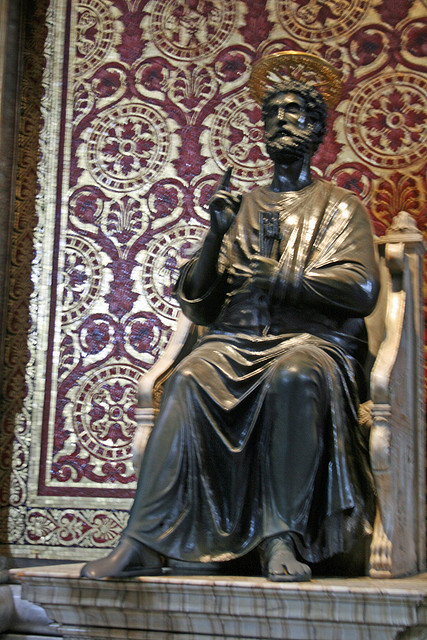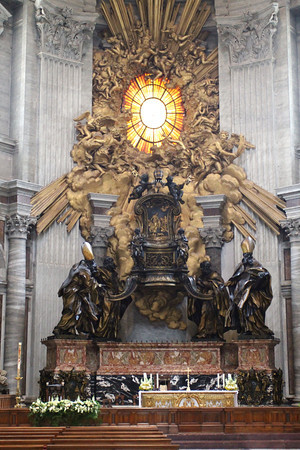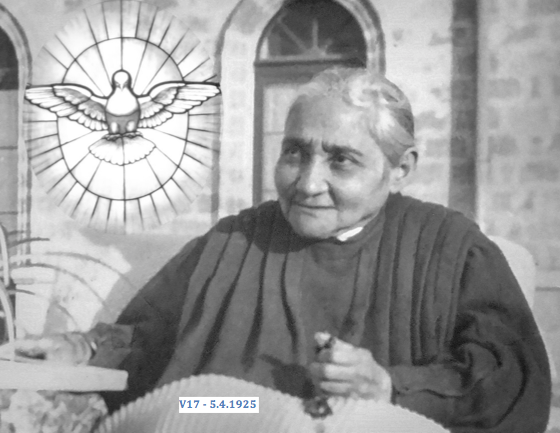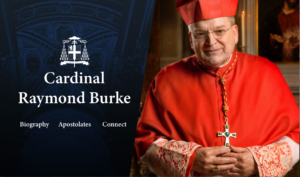 St. Peter’s statue, Vatican City, Rome
St. Peter’s statue, Vatican City, Rome
***
 The Chair of St. Peter, Vatican City, Rome
The Chair of St. Peter, Vatican City, Rome
The “cathedra” (chair) is the throne established where the bishop resides, hence the name cathedral, given to the church where his seat is placed. Metaphorically, it represent the episcopal authority itself. “The Chair of St. Peter” means, therefore, a memory of St. Peter’s episcopate, and his primacy as head of the Church.
To honor the dignity of the “Prince” to whom Jesus committed the power of the keys, the Church instated the Feast of the “Chair of St. Peter”, which is found in the Roman calendar at this date since the year 336.
***
Book of Heaven
Volume 2 – May 2, 1899
How all Heaven is veiled in the Church.
… He (Jesus) made me (Luisa) see the Church, telling me these exact words: “All Heaven is veiled in my Church. Just as in Heaven one is the head, which is God, and many are the saints, of different conditions, orders and merits, so in my Church, in which all Heaven is veiled, one is the head, which is the Pope, and the Sacrosanct Trinity is veiled even in the triple tiara that covers his head; and many are the members that depend on this head – that is, different dignities, various orders, superior and inferior, from the littlest to the greatest, they all serve to embellish my Church. Each one, according to its degree, has the office entrusted to it, and by the exact fulfillment of the virtues it comes to give from itself a splendor so very fragrant to my Church, that the earth and Heaven are perfumed and illuminated, and the people are so drawn by this light and by this fragrance, that it is almost impossible for them not to surrender to the truth. I leave it to you, then, to consider those infected members which, instead of shedding light, cast darkness. How much torment they cause in my Church.” …
***
Excerpt from the Third Appeal
by the Servant of God Luisa Piccarreta, the Little Daughter of the Divine Will
… Therefore, I appeal to all; and I make this appeal together with Jesus, with His own tears, with His ardent sighs, with His Heart that burns, that wants to give Its “FIAT.”..From within the “FIAT” we have come forth; It has given us life. It is just, it is our obligation and duty to return into It, into our dear and interminable heritage.
And in the first place, I appeal to the Highest Hierarch, to the Roman Pontiff, to His Holiness, to the representative of the Holy Church, and therefore the representative of the Kingdom of the Divine Will. At his holy feet, this little, tiny child places this Kingdom, so that he dominate It and make It known, and with his paternal and authoritative voice, call his sons to live in this Kingdom so holy.
May the Sun of the Supreme “FIAT” invest him and form the first Sun of the Divine Volition in Its Representative on earth; and forming Its (Divine Will’s) primary Life in him (the Pope) who is the Head of all, It will spread Its interminable rays in all the world; and eclipsing all with Its Light, It will form one flock and one Shepherd. …

